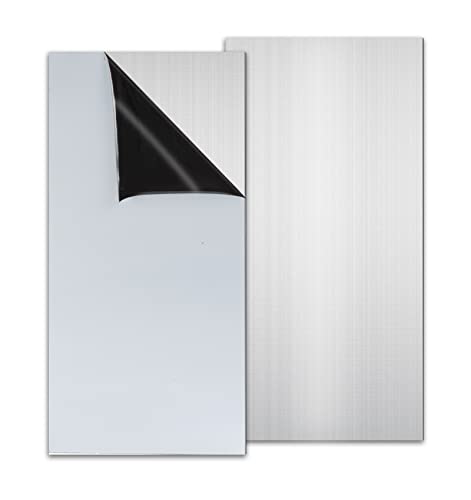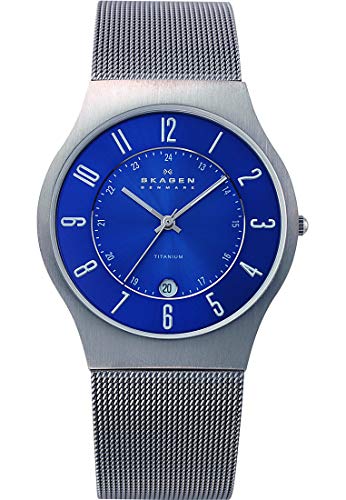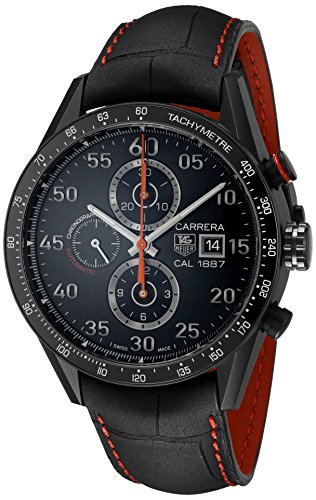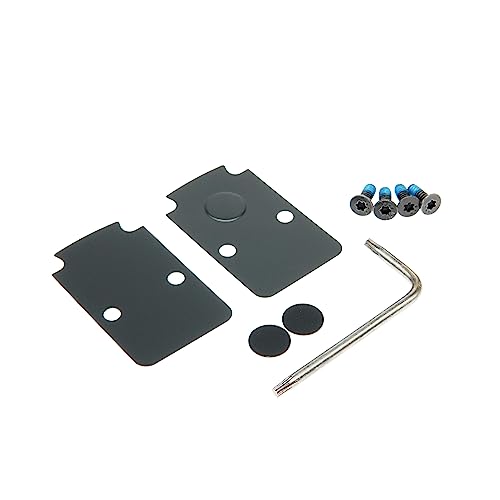Are you in search of a new timepiece to add to your collection? With so many options available, it can be overwhelming to navigate the world of watches. One common dilemma that watch enthusiasts face is choosing between stainless steel and titanium watches. These two materials offer their own unique set of advantages and considerations. In this blog post, we will help you unravel the differences between stainless steel and titanium watches, empowering you to make an informed decision. Whether you prioritize durability, style, or functionality, we’ve got you covered. Join us as we delve into the intricacies of these two popular watch materials.
Top-selling Stainless Steel Watches
What is Stainless Steel?
Stainless steel is a widely used material that is known for its exceptional durability, resistance to corrosion, and versatility in design. It is commonly used in various industries, including automotive, construction, and most notably, in the world of watches. In this blog section, we will dive deeper into the composition and characteristics of stainless steel watches.
Composition of Stainless Steel Watches
Stainless steel watches are primarily made from an alloy that combines iron, chromium, and other elements. The specific composition may vary depending on the grade of stainless steel used. The most common grades used in watchmaking are 316L and 904L stainless steel, each with its unique properties and benefits.
316L Stainless Steel
- Comprised of iron, chromium, nickel, and molybdenum
- Significantly higher resistance to corrosion than regular steel
- Non-magnetic, making it less prone to interference from magnetic fields
- Excellent strength and durability
- Often referred to as “marine grade” stainless steel due to its outstanding resistance to saltwater corrosion
904L Stainless Steel
- Contains iron, chromium, nickel, molybdenum, and added amounts of copper and smaller amounts of carbon
- Even greater resistance to corrosion and pitting than 316L stainless steel
- Extremely durable and able to maintain its appearance over time
- Often used in high-end luxury watches due to its premium qualities
Characteristics of Stainless Steel Watches
Stainless steel watches have several characteristics that make them highly desirable timepieces. Let’s explore these characteristics in detail:
Durability
- Exceptional strength and resilience, ensuring longevity
- Resistant to scratches, impacts, and wear, maintaining its appearance over time
- Ideal for individuals with an active lifestyle or those who frequently wear their watches
Resistance to Corrosion
- Stainless steel naturally forms a passive layer that protects it from rust and corrosion
- Suitable for everyday wear, including exposure to moisture and extensive contact with different environmental conditions
- Highly resistant to tarnishing and discoloration, keeping your watch looking pristine
Versatility in Design
- The malleability of stainless steel allows for intricate and diverse watch designs
- Available in different finishes, such as polished, brushed, or sandblasted, offering a range of aesthetic options
- Complements all types of attire and occasions, from casual wear to formal events
Comparing Stainless Steel Watches to Other Materials
To better understand the benefits of stainless steel watches, let’s compare them to other commonly used watch materials:
| Material | Durability | Corrosion Resistance | Design Versatility |
|---|---|---|---|
| Stainless Steel Watches | High | Excellent | Wide range of designs available |
| Leather Watches | Moderate | Moderate | Limited by the nature of leather |
| Titanium Watches | High | Excellent | Can be more limited in design options |
| Ceramic Watches | High | Excellent | Limited color options, less malleability |
What is Titanium?
Titanium, a fascinating metal that has revolutionized the watch industry, has gained immense popularity in recent years. Known for its remarkable properties and diverse applications, it has become a material of choice for watchmakers worldwide. In this blog post, we will explore the properties and advantages of titanium watches, highlighting their lightweight nature, exceptional strength, hypoallergenic qualities, and modern aesthetic.
Lightweight Nature: Comfortable All Day Long
One of the key attributes of titanium watches is their feather-light weight. Compared to stainless steel, titanium is approximately 30% lighter, making it an ideal choice for those who value comfort and convenience. The absence of excess weight ensures that you can wear your titanium watch all day without feeling any strain on your wrist. Whether you are attending a business meeting, hitting the gym, or simply going about your daily routine, a titanium watch offers a comfortable fit that you won’t even notice.
Strength: Durability That Lasts Generations
Don’t be fooled by its lightweight nature; titanium is incredibly durable. In fact, it is known for its strength-to-weight ratio, making it one of the toughest materials used in watchmaking. With a high tensile strength, titanium watches are highly resistant to scratches, dents, and corrosion. This exceptional durability ensures that your timepiece will remain in pristine condition for many years, retaining its original beauty and functionality. Whether you are diving into the depths of the ocean or embarking on an adventurous expedition, a titanium watch will withstand the rigors of your active lifestyle.
Hypoallergenic Qualities: Gentle on Your Skin
For individuals with sensitive skin, finding a watch that does not cause irritation can be challenging. Fortunately, titanium comes to the rescue. Being hypoallergenic, it is suitable for even the most sensitive skin types. Unlike certain metals such as nickel, which can lead to skin reactions, titanium is biocompatible and does not cause allergies or rashes. If you have ever experienced discomfort or redness due to wearing a watch, upgrading to a titanium timepiece can provide relief and ensure that you can enjoy wearing a watch without any concerns.
Modern Aesthetic: A Timeless Style Statement
In addition to its exceptional properties, titanium possesses a modern aesthetic that elevates the style quotient of any timepiece. Its sleek and contemporary appearance adds a touch of sophistication to your wrist, making it a fashion statement that stands the test of time. Whether you prefer a minimalist design or a bold, eye-catching watch, titanium alloys beautifully with various other materials such as ceramic or leather, allowing watchmakers to create stunning and unique timepieces. The combination of technology, craftsmanship, and the versatility of titanium empowers designers to push the boundaries of watch design and deliver exquisite pieces that appeal to watch enthusiasts worldwide.
Final Thoughts
Titanium watches offer a plethora of advantages that make them a compelling choice for watch lovers. Below is a summary of the key advantages of titanium watches:
- Lightweight: Approximately 30% lighter than stainless steel, ensuring all-day comfort.
- Strength: Exceptional strength-to-weight ratio, providing durability that lasts.
- Hypoallergenic: Biocompatible properties ensure compatibility with sensitive skin.
- Modern Aesthetic: Sleek, contemporary look that adds a touch of sophistication.
Investing in a titanium watch allows you to enjoy the best of both worlds – exceptional functionality and stunning design. Whether you are a sports enthusiast, a professional seeking a distinguished accessory, or simply someone who appreciates the fusion of style and performance, a titanium watch is a timepiece that cannot be overlooked. Experience the wonders of this versatile material and embark on a journey poised to stand the test of time.
Comparison of Stainless Steel and Titanium Watches
When it comes to choosing a watch, the material used in its construction plays a crucial role in determining its durability, appearance, and overall performance. Two popular choices in the world of watchmaking are stainless steel and titanium. In this article, we will explore the key differences between stainless steel and titanium watches, specifically focusing on weight, durability, scratch resistance, cost, and overall appearance.
Weight
- Stainless Steel:
- Moderate weight
- Could feel heavier on the wrist compared to titanium watches
- Titanium:
- Lightweight
- Remarkably lighter than stainless steel watches
- Provides a comfortable wearing experience, especially for those with sensitive wrists or who prefer a lighter accessory
Durability
- Stainless Steel:
- Highly durable material
- Resistant to corrosion, tarnish, and rust
- Can handle everyday wear and tear
- Titanium:
- Excellent strength-to-weight ratio
- Extremely durable
- Resistant to corrosion and rust like stainless steel
- Enhanced strength and resistance qualities compared to stainless steel
- Suitable for adventurous activities or professions with higher physical demands
Scratch Resistance
- Stainless Steel:
- Prone to scratches and scuffs
- Stainless steel watches may show signs of wear over time
- Titanium:
- Greater scratch resistance than stainless steel
- Retains its appearance for longer periods
- Ideal for those who desire a watch with a more polished and pristine look throughout its lifespan
Cost
- Stainless Steel:
- More economical option compared to titanium
- Available at a wide range of price points to suit various budgets
- Offers excellent value for money
- Titanium:
- Generally more expensive than stainless steel
- Higher production costs due to the difficulty of working with titanium as a material
- Considered a luxury option due to its high strength, light weight, and exclusive characteristics
Overall Appearance
- Stainless Steel:
- Classic and timeless appeal
- Well-suited for both formal and casual occasions
- Polished or brushed finishes available
- Titanium:
- Modern and contemporary appearance
- Sleek and sophisticated
- Often comes with brushed or matte finishes for an understated elegance
- Some titanium watches may have unique color variations created through surface treatments like PVD coating
In conclusion, when choosing between stainless steel and titanium watches, it is essential to consider personal preferences, lifestyle, and budget. Stainless steel watches offer durability, a versatile appearance, and an attractive price point. On the other hand, titanium watches provide exceptional strength, lightweight comfort, increased scratch resistance, and a more luxurious appeal. Ultimately, the choice between these two materials depends on individual style preferences and the desired features that complement one’s lifestyle.
Factors to Consider When Choosing Between Stainless Steel and Titanium
Choosing the right material for your watch can be a challenging decision. Stainless steel and titanium are two popular options known for their durability, strength, and modern aesthetic. Both materials have their own unique characteristics that make them suitable for different lifestyles and preferences. In this blog post, we will explore several factors to consider when choosing between stainless steel and titanium watches. By understanding these factors, you can make an informed decision that aligns with your personal style, usage, budget, comfort, and maintenance preferences.
Personal Style
The style of your watch is a reflection of your personal taste and fashion sense. Here are some considerations regarding personal style:
- Appearance: Stainless steel watches often have a polished and shiny look, while titanium watches tend to have a brushed and more subdued appearance. Consider your preferred aesthetic and how it complements your overall style.
- Weight: Titanium watches are significantly lighter than stainless steel watches. If you prefer a lightweight watch that feels almost weightless on your wrist, titanium might be the better option for you. On the other hand, if you enjoy the heft and substantial feel of a heavier watch, stainless steel could be more suitable.
- Color options: Stainless steel watches typically come in silver or grey tones, while titanium watches can offer a wider range of colors, including grey, black, and even gold-toned options. The availability of different colors gives titanium watches an edge in terms of customization and personalization.
Usage
Understanding how and where you will be using your watch is crucial. Take into account the following factors:
- Durability: Both stainless steel and titanium watches are highly durable materials, but titanium excels in terms of strength-to-weight ratio. This makes titanium watches more resistant to scratches, dents, and other forms of damage. Stainless steel watches, while still durable, may show signs of wear over time.
- Corrosion resistance: Stainless steel is generally corrosion-resistant, making it suitable for everyday wear and exposure to moisture. Titanium, on the other hand, is more corrosion-resistant than stainless steel, making it an excellent choice for those who frequently engage in water sports or other water-related activities.
- Sports and outdoor activities: If you lead an active lifestyle and plan to wear your watch during sports or outdoor activities, titanium’s lightweight and corrosion-resistance make it a reliable choice. It can withstand harsh conditions and keep up with your active pursuits without weighing you down.
Budget
Your budget is undoubtedly an important factor to consider when making any purchase. Here’s a breakdown of the cost differences between stainless steel and titanium watches:
- Pricing: Stainless steel watches tend to be less expensive compared to titanium watches. If budget is a significant concern, stainless steel might be the more affordable option for you.
- Long-term investment: While stainless steel watches may be cheaper initially, titanium watches can be considered a long-term investment. The durability and longevity of titanium make it a valuable choice in the long run, potentially reducing or eliminating the need for repairs or replacements.
Comfort
The comfort of your watch is essential, especially if you plan to wear it for extended periods. Consider the following factors:
- Skin sensitivity: Titanium is considered a hypoallergenic material, making it suitable for individuals with sensitive skin or allergies. Stainless steel can sometimes cause skin irritation or allergies, particularly if it contains nickel. If you have sensitive skin, titanium may be a more comfortable option for you.
- Weight: As mentioned earlier, titanium watches are significantly lighter than stainless steel watches. If you have a preference for a lightweight watch that won’t weigh you down, titanium should be strongly considered for its comfort.
Maintenance
Proper maintenance is crucial to keep your watch looking its best and functioning optimally. Consider the following maintenance factors:
- Scratch resistance: Titanium is more scratch-resistant than stainless steel, meaning it will maintain its appearance better over time. Stainless steel watches may develop visible scratches, particularly on polished surfaces.
- Polishing and restoring: Both stainless steel and titanium watches can be polished and restored to a like-new appearance. However, it may be easier and less time-consuming to restore the surface of a titanium watch due to its inherent properties.
- Magnetism: Stainless steel watches are more susceptible to magnetic fields, which can affect their accuracy. Titanium watches, on the other hand, are not prone to magnetic interference. If you work in environments with high magnetic fields, a titanium watch could be a better choice.
Summary
Choosing between stainless steel and titanium watches requires careful consideration of personal style, usage, budget, comfort, and maintenance preferences. Here is a summary of the key points to help you make your decision:
- Personal style: Consider the appearance, weight, and color options that align with your personal style.
- Usage: Evaluate the durability, corrosion resistance, and suitability for sports and outdoor activities.
- Budget: Weigh the initial cost against the long-term investment value.
- Comfort: Consider skin sensitivity and weight for a comfortable wearing experience.
- Maintenance: Assess scratch resistance, ease of polishing and restoration, and susceptibility to magnetism.
Ultimately, both stainless steel and titanium watches offer unique benefits, and choosing the right material depends on your individual needs and preferences. So take your time, understand these factors, and select a watch that not only looks great but also withstands the test of time.
Making the Right Choice for Your Timepiece
In conclusion, when choosing between stainless steel and titanium watches, it is important to consider factors such as style, durability, and weight. Stainless steel watches offer a classic and timeless look, making them perfect for those who value tradition. On the other hand, titanium watches provide a lightweight and modern option for those seeking both style and comfort. Depending on your preference, both materials have their advantages. Ultimately, the choice between stainless steel and titanium depends on your personal style and lifestyle.

















